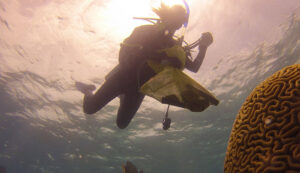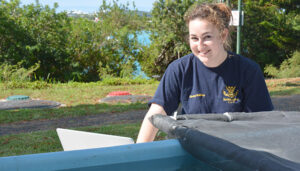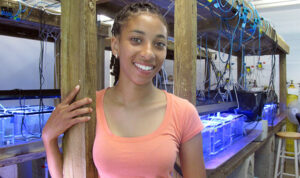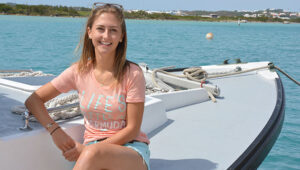Bermuda Program Alumnae Pursue Careers in Science, Law, and Engineering

“I call them the Female Dream Team,” said BIOS educator Kaitlin Baird
The Bermuda Program, designed for high school and college students, began in 1976 as a way to encourage students to consider careers in marine, atmospheric, and oceanographic sciences. It is part of BIOS’s Ocean Academy, a suite of hands-on programs offered for 10-to 21-year-old Bermudians that centers on science, technology, engineering, and math (STEM) topics. Last year, 1,390 local students and teachers were involved in Ocean Academy programs.
For Kaitlin Baird, assistant director of science education programs at BIOS, a highlight of her job is learning about the academic and career achievements of Bermuda Program interns. Participants in the Bermuda Program complete paid summer internships that allows them to investigate a marine, oceanographic, or atmospheric science research topic. This summer, for example, 10 Bermudian students will spend 4 to 8 weeks working with BIOS faculty, research staff specialists, and education coordinators.
Each have an interest in STEM careers, and some will use their internship as an opportunity to collect data for their university thesis work. At the end of their internships, students formally present their final reports and project results to peers at BIOS.
In recent months, Baird learned of several female program alums currently enrolled in, or about to start, graduate school who credit their time at BIOS and in the Bermuda Program for helping to shape their career interests. “I call them the Female Dream Team,” Baird said.

Christiana Halliday
Age 22
Currently she is: working at the Bermuda Underwater Exploration Institute (BUEI). “I have a variety of responsibilities, but predominately I am guiding tours and leading school camps. I leave BUEI in August to begin a postgraduate degree in law at the University of Law in London, England. I hope to be able to combine my background in environmental sciences with law to pursue a career in environmental law and policy.”
How she became involved at BIOS: “I first joined the Bermuda Program in 2011, when I was 18. I had heard about it from BIOS educator JP Skinner, and he advised applying as I was starting a degree in environmental science that September. I was accepted into the Coral Reef Ecology and Optics Laboratory, where I continued to work for each following summer.”
How the program influenced her career: “Being in the Bermuda Program definitely gave me an advantage to my classmates when I first started at university, as I had been introduced to scientific writing and referencing and statistics. Over the summers at BIOS, I felt I was able to learn more relevant skills from BIOS scientists Eric Hochberg and Tim Noyes than I did at university, and both have always been very patient when explaining what needs to be done and why. Kaitlin and Tim influenced my undergrad dissertation topic, and guided me through the process. They have continued to help me with career advice (and helped me find jobs) since I left BIOS.”

Kascia White
Age 23
Currently she is: a graduate student in the Marine Affairs Program at Dalhousie University in Halifax, Canada. “My graduate project looks at applying adaptive management approaches to Bermuda’s data limited shallow water snapper fishery. The ultimate goal of this study is to contribute to improving the management of the shallow water snapper fishery in Bermuda. I am completing a 5-week internship with the Department of Environmental Protection (Marine Resources Section) as a partial fulfillment to my graduate degree.”
How she became involved at BIOS: “After being in the Waterstart program in 2006 or 2007, I was encouraged to apply to the Bermuda Program, when I was about 16 years old. I have been interested in marine life since a very young age. When my mother told me about the BIOS program it was something that I just had to try.”
How the program influenced her career: “My experiences as a Bermuda Program student has had an important influence on my university experience as well as my career choices. As a Bermuda Program student I was able to complete my undergraduate research thesis under the tutelage of (BIOS faculty member) Samantha De Putron. My research looked at understanding the effects of ocean acidification on calcifying organisms, specifically focusing on mustard hill coral. After completing my masters degree in December, I hope to return to Bermuda and start a career in marine management and conservation.”

Celine Collis
Age 22
Currently she is: spending her summer diving Bermuda’s reefs. “I am working on completing my Divemaster certification at Triangle Diving. I recently graduated with a bachelor of science degree from the University of Toronto, where I did a double major in biodiversity and conservation biology and pre-law. This fall, I will be attending the University of Oxford in England where I will pursue a master’s degree in Nature, Society and Environmental Governance. I hope to pursue a law degree and eventually return to Bermuda to practice environmental law. Growing up on the island gave me an appreciation for all its natural beauty, and BIOS instilled in me a sense of duty to help protect Bermuda’s fragile environment.”
How she became involved at BIOS: “I was 19 when I applied for the Bermuda Program internship at BIOS. I wanted an intellectually stimulating job where I could gain good work experience; however, I love being outside and did not want to have to work behind a desk all day. I had always known about BIOS because of their fantastic outreach program, as BIOS scientists came and spoke to my school (Bermuda High School) on various occasions. I explored BIOS’s website and found the Bermuda Program. The internship was the perfect fit. I garnered invaluable lab experience while also enjoying the outdoors surveying Bermuda’s beautiful reefs. I spent three amazing summers at BIOS in the Coral Reef Ecology and Optics Lab with (BIOS scientists) Eric Hochberg and Tim Noyes.”
How the program influenced her career: “After my first summer working at BIOS, I became very interested in marine biology and ecology. As a result, I took many courses in university that pertained to these interesting fields of biology. BIOS certified me as a Science Diver under the American Academy of Underwater Sciences, and my love for diving for research led me to pursue a field course in the Bahamas studying fish assemblages. I had always been interested in pursuing a career in the environmental field, and working at BIOS affirmed these interests. BIOS opened my eyes to the range of environmental issues that this island faces—issues that I hope to help tackle one day.”
